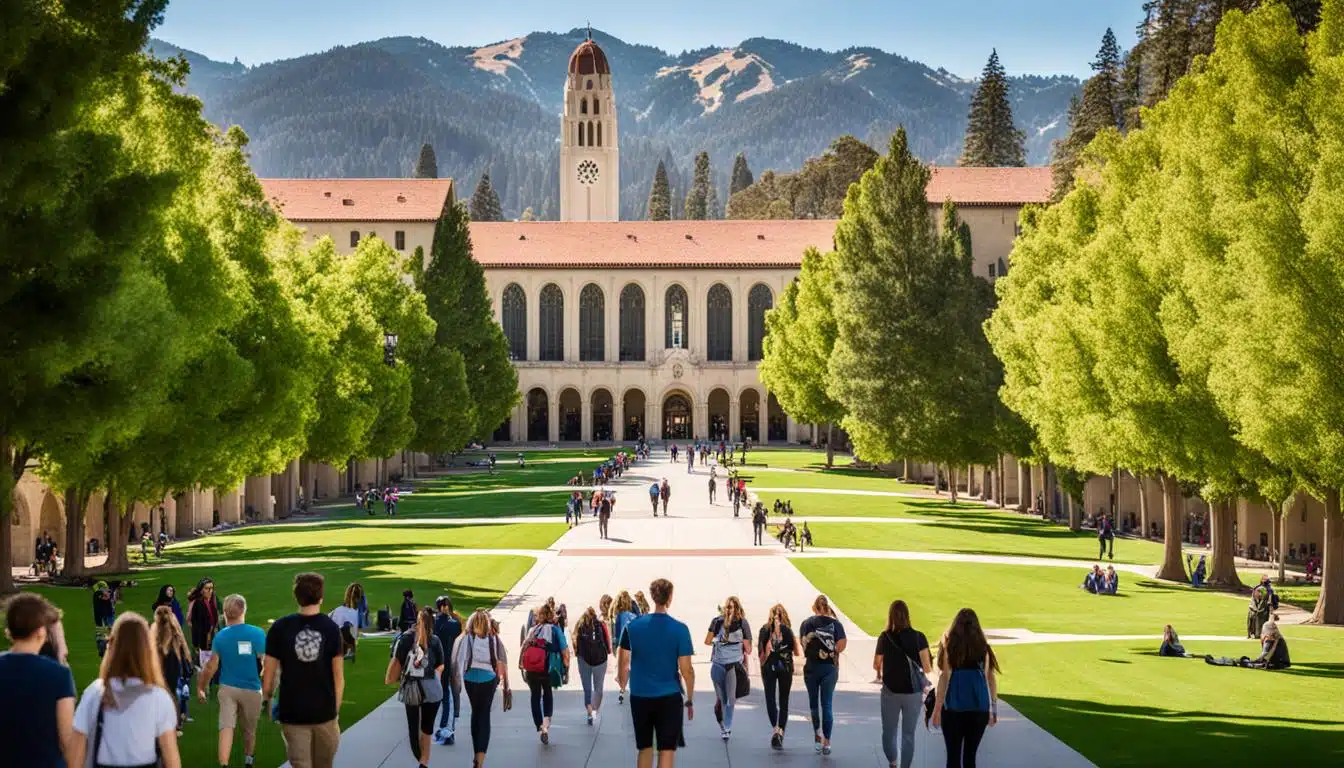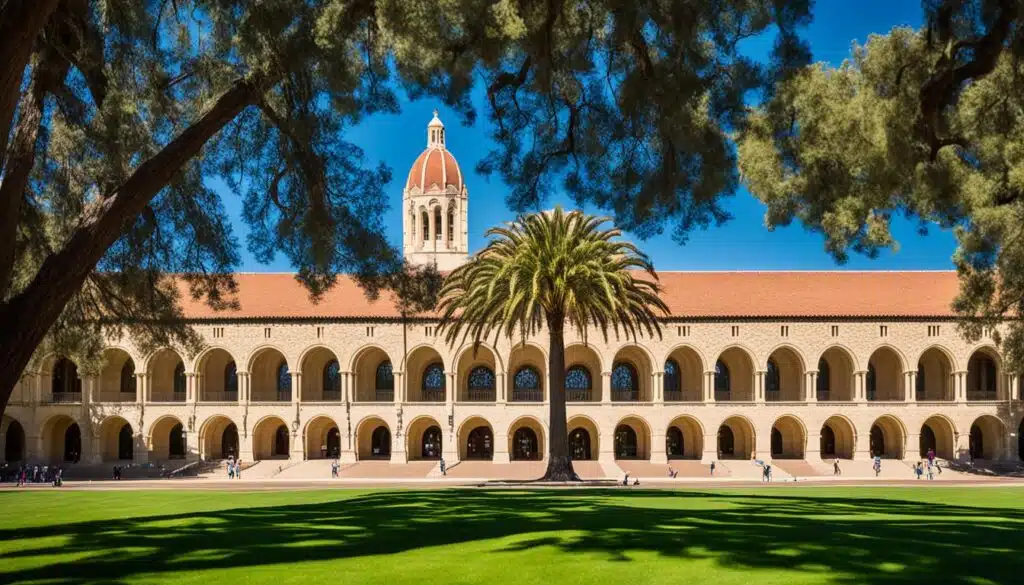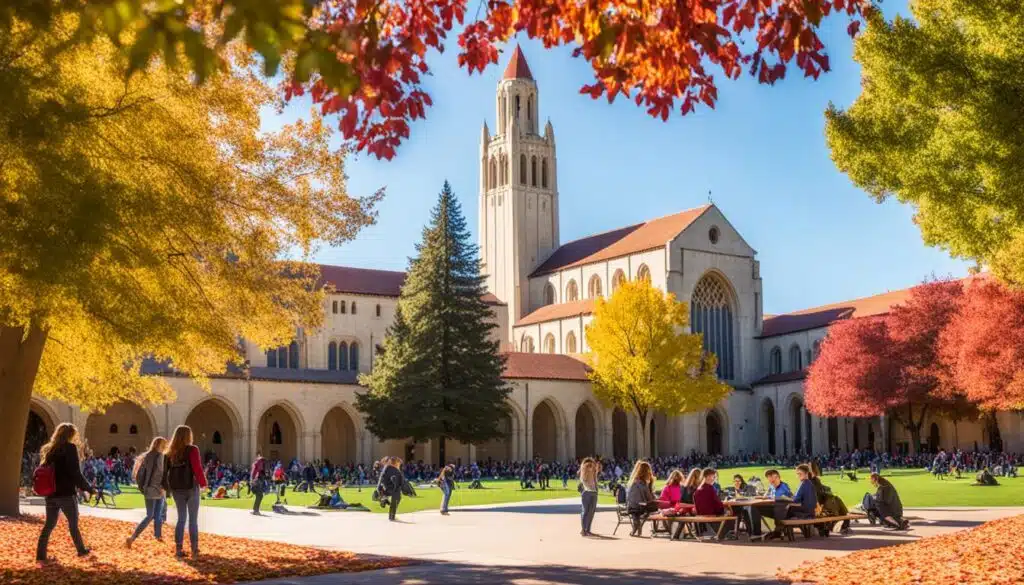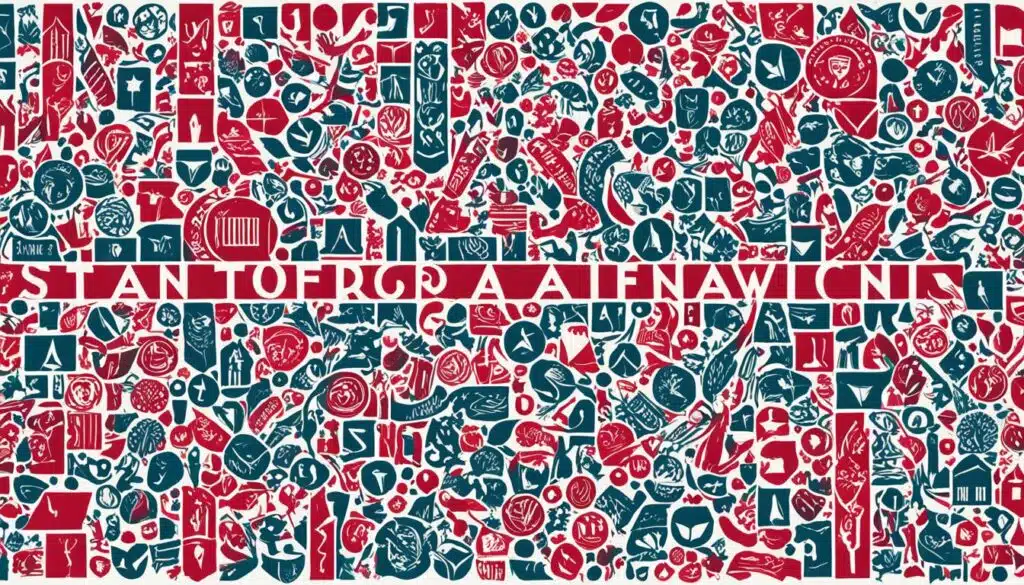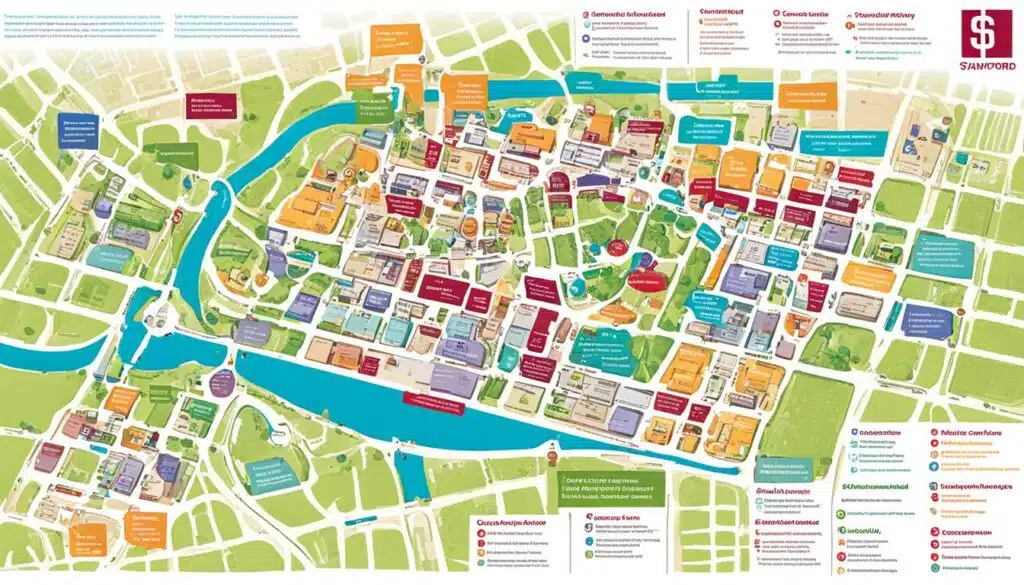Stanford University, located in the heart of Silicon Valley, is a prestigious research institution known for its academic excellence. As one of the top-ranking universities in the world, Stanford offers a transformative higher education experience that attracts students from across the globe. From its vibrant campus life to its renowned faculty and cutting-edge research facilities, Stanford University provides students with unparalleled opportunities to pursue their passions and achieve their academic goals.
Founded in 1885 by Leland and Jane Stanford, the university has a rich history of educating future leaders and innovators. Stanford’s commitment to academic excellence can be seen in its diverse range of undergraduate and graduate programs, spanning disciplines such as engineering, humanities, sciences, business, law, medicine, and interdisciplinary studies.
With its extensive network and resources, including the prestigious Graduate School of Business and the School of Education, Stanford offers students a well-rounded education that prepares them for success in various professional fields.
Stanford University takes pride in its strong alumni network, which includes notable figures such as former U.S. Secretary of State Condoleezza Rice and Google co-founder Larry Page. The university’s alumni have made significant contributions to their respective industries, demonstrating the impact of a Stanford education.
When it comes to campus life, Stanford offers a vibrant and inclusive community that fosters personal growth and cultural exchange. Students can participate in a wide array of student organizations, cultural events, and athletic programs, enhancing their overall college experience. Furthermore, Stanford is committed to diversity and inclusion, ensuring that all students feel welcomed and valued.
In conclusion, Stanford University stands as a symbol of academic excellence, research innovation, and inclusivity. Its rigorous curriculum, top-notch faculty, and commitment to impactful research make it a top choice for students seeking a transformative educational experience. Whether it’s pursuing undergraduate studies as an aspiring entrepreneur or studying the cutting-edge advancements in artificial intelligence, Stanford University offers a supportive environment that nurtures intellectual curiosity and fosters future leaders.
Key Takeaways:
- Stanford University is a prestigious research institution located in Silicon Valley.
- The university offers a wide range of undergraduate and graduate programs across various disciplines.
- Stanford’s rich history and notable alumni demonstrate its commitment to academic excellence.
- Campus life at Stanford is vibrant, with numerous student organizations and cultural events.
- Stanford University values diversity, inclusivity, and creating an environment that fosters personal growth.
A Glimpse into Stanford University’s History
Stanford University, founded in 1885 by Leland and Jane Stanford, carries a notable legacy rooted in academic excellence and service. Established as a memorial to their son, the university has since grown from a modest institution into a globally recognized research university.
From its inception, Stanford University has upheld a commitment to academic excellence. Renowned for its rigorous curriculum and distinguished faculty, the university continuously pushes the boundaries of knowledge across a wide range of disciplines. Students at Stanford are immersed in an intellectually stimulating environment that fosters critical thinking, innovation, and a pursuit of knowledge.
Furthermore, service has been ingrained in the fabric of Stanford’s culture since its founding. The university emphasizes the importance of giving back to the community and making a positive impact on society. Students are encouraged to engage in volunteer work, community service projects, and outreach initiatives, fostering a sense of social responsibility and empathy.
Over the years, Stanford University has remained steadfast in its mission to provide a transformative educational experience grounded in academic excellence and service. The university’s rich history and commitment to its founding principles have solidified its position as a world-class institution renowned for its contributions to academia, research, and society as a whole.
Stanford University Milestones:
| Year | Key Milestone |
|---|---|
| 1885 | Stanford University founded by Leland and Jane Stanford |
| 1891 | Stanford opens its doors with 555 students |
| 1919 | Stanford Graduate School of Business established |
| 1946 | Stanford Alumni Association formed |
| 1951 | Stanford School of Education established |
| 1971 | Stanford achieves official university status |
Academic Offerings and Prestige
Stanford University is renowned for its prestigious academic offerings across a wide range of disciplines. The university’s esteemed schools consistently rank among the best in the world, attracting top students and faculty from across the globe.
Stanford’s academic landscape is diverse and comprehensive, encompassing schools of engineering, humanities, sciences, business, law, medicine, and interdisciplinary studies. Each school offers rigorous programs that provide students with the knowledge and skills necessary to excel in their chosen fields.
Whether students are interested in pursuing a degree in engineering to develop innovative technology solutions, studying the humanities to gain a deeper understanding of human culture and expression, exploring the intricacies of the sciences, or delving into the complexities of business, law, medicine, or interdisciplinary studies, Stanford University offers a wealth of opportunities to pursue their academic passions.
This prestigious institution’s commitment to academic excellence is reflected in its faculty, who are leading experts in their fields, and its rigorous curriculum that combines theoretical knowledge with practical application. Students at Stanford are exposed to cutting-edge research, innovative teaching methods, and interdisciplinary collaborations, ensuring a transformative educational experience.
Stanford University’s academic offerings are designed to foster intellectual curiosity, critical thinking, and problem-solving skills, empowering students to make meaningful contributions in their chosen disciplines and in society as a whole.
Quick Facts: Academic Offerings and Prestige
| School | Discipline |
|---|---|
| School of Engineering | Engineering |
| School of Humanities | Humanities |
| School of Sciences | Sciences |
| Graduate School of Business | Business |
| School of Law | Law |
| School of Medicine | Medicine |
| School of Interdisciplinary Studies | Interdisciplinary Studies |
Cutting-Edge Research and Innovation
Stanford University is renowned for its relentless pursuit of cutting-edge research and innovation. The university consistently pushes the boundaries of knowledge in various fields, making significant contributions to advancements in artificial intelligence, biotechnology, renewable energy, and the social sciences.
Stanford’s commitment to research is evident through its numerous research initiatives and centers, which foster collaboration and interdisciplinary approaches to solving complex societal challenges. The university’s state-of-the-art laboratories and cutting-edge facilities provide researchers with the tools they need to make groundbreaking discoveries.
The university’s research initiatives, technological advancements, and interdisciplinary collaborations drive advancements and shape the future across various sectors.
One of Stanford’s notable areas of research is artificial intelligence (AI). The university’s AI research spans across domains such as machine learning, natural language processing, computer vision, robotics, and more. Through innovative research, faculty and students at Stanford are revolutionizing the field of AI, developing algorithms and technologies that have practical applications in areas like healthcare, autonomous systems, and data analysis.
In the field of biotechnology, Stanford researchers are making significant strides in areas such as genomics, stem cell research, and bioengineering. Their groundbreaking work has the potential to revolutionize healthcare, drive advancements in personalized medicine, and improve our understanding of the human body.
Stanford’s commitment to renewable energy research aims to address one of the most pressing challenges of our time. Faculty and students are working on developing sustainable energy sources, improving energy efficiency, and finding innovative solutions to mitigate the impact of climate change. Their research in renewable energy holds the key to a cleaner and more sustainable future.
Furthermore, Stanford’s social sciences research plays a critical role in understanding and addressing complex societal issues. Faculty and students engage in interdisciplinary research that tackles topics such as inequality, poverty, education, and public policy. Through rigorous research methodologies and thoughtful analysis, Stanford contributes to shaping policies and creating positive social change.
Overall, Stanford University’s commitment to research, innovation, and interdisciplinary collaborations positions it as a global leader in advancing knowledge and driving transformative change. The university’s groundbreaking discoveries and contributions to various fields continue to have a lasting impact on society and shape the future.
| Research Areas | Impact |
|---|---|
| Artificial Intelligence | Revolutionizing industries and driving technological advancements |
| Biotechnology | Advancing healthcare and personalized medicine |
| Renewable Energy | Promoting sustainability and mitigating the impact of climate change |
| Social Sciences | Informing policies and driving positive social change |
Campus Life and Community Engagement
Experience a vibrant and diverse campus life at Stanford University. Our campus offers a multitude of opportunities for students to engage in extracurricular activities, explore their passions, and actively contribute to both our campus and the local community.
Student Organizations
At Stanford, we believe in fostering a sense of community and belonging for all students. With over [Number] student organizations, you’ll find a group or club that aligns with your interests and values. Whether you’re interested in joining an academic club, cultural organization, sports team, or a service-oriented group, there’s something for everyone.
These student organizations provide a platform for students to connect with fellow enthusiasts, gain leadership experience, and create lasting friendships. They offer a range of activities, such as workshops, events, and conferences, that enrich your overall college experience.
Cultural Events
Immerse yourself in a vibrant cultural scene at Stanford. Throughout the year, our campus hosts a variety of cultural events that celebrate diversity and promote cross-cultural understanding. From music and dance performances to art exhibitions and theatrical productions, there’s always something captivating happening on campus.
These cultural events not only entertain but also provide an opportunity to learn about different cultures, traditions, and perspectives. They serve as a platform for dialogue and encourage the exchange of ideas, fostering a more inclusive and accepting community.
Athletic Programs
Stay active and support our Stanford Cardinal teams by participating in our athletic programs. Whether you’re a sports enthusiast or simply looking to stay fit, our state-of-the-art facilities and dedicated coaches provide all the resources you need to excel in your chosen sport.
Join one of our varsity, club, or intramural teams and experience the thrill of competition, teamwork, and personal growth. From basketball and soccer to swimming and tennis, there are options for athletes of all levels and interests.
Community Service
Make a positive impact on the world through community service at Stanford. Engage in meaningful volunteer work with local organizations and contribute to the betterment of society. Our university emphasizes the importance of giving back and provides numerous opportunities for students to engage in community service.
Through community service projects, you’ll develop empathy, compassion, and a deeper understanding of societal challenges. By actively participating in service activities, you’ll gain valuable leadership skills, build relationships with like-minded individuals, and make a lasting difference in the lives of others.
| Opportunities | Description |
|---|---|
| Student Organizations | Over [Number] diverse student organizations catering to various interests and passions. |
| Cultural Events | A wide range of cultural events promoting diversity and cross-cultural understanding. |
| Athletic Programs | Varsity, club, and intramural sports teams catering to athletes of all levels. |
| Community Service | Opportunities to engage in meaningful volunteer work and contribute to the community. |
Notable Alumni and Achievements
Stanford University takes pride in its impressive roster of notable alumni who have achieved remarkable success in their respective fields. These esteemed individuals have made lasting contributions and left a significant impact on society, showcasing the university’s commitment to excellence and fostering a spirit of innovation and leadership.
From groundbreaking discoveries to influential leadership positions, Stanford alumni have excelled across a wide range of domains, including academia, science, literature, business, and technology. Many have been recognized with prestigious accolades such as the Nobel Prize and Pulitzer Prize, highlighting their exceptional achievements and groundbreaking research.
Stanford alumni who have been awarded the Nobel Prize include esteemed individuals such as Carl Wieman (Physics), Robert Woodrow Wilson (Physics), and Paul R. Milgrom (Economic Sciences). Their pioneering work has shaped our understanding of the universe and transformed fields of study for generations to come.
“The true sign of intelligence is not knowledge but imagination.” – Albert Einstein
Additionally, Stanford alumni have been celebrated as Pulitzer Prize winners, recognized for their exceptional contributions to literature and journalism. Notable figures such as Donald Kennedy, David Kennedy, and John McPhee have received this esteemed honor for their exemplary writing and profound insights into various aspects of society.
Stanford’s entrepreneurial spirit is reflected in the success of its alumni, many of whom have gone on to become CEOs of renowned companies. Figures such as Satya Nadella (Microsoft), Susan Wojcicki (YouTube), and Thomas Siebel (C3 AI) have made remarkable strides in the business world, leading their organizations to new heights of innovation and success.
The university’s emphasis on entrepreneurship has also given rise to a significant number of startup founders. Stanford alumni have launched groundbreaking companies such as Google, Yahoo, Netflix, and Instagram, revolutionizing industries and reshaping the technological landscape.
Stanford’s commitment to entrepreneurship and societal impact can be witnessed through the achievements of its graduates. Through groundbreaking research, influential leadership roles, and innovative entrepreneurial ventures, Stanford alumni continue to shape the world and leave a lasting legacy.
Admissions Process and Requirements
Are you considering applying to Stanford University? The admissions process at this prestigious institution is known for its high level of competitiveness. To give yourself the best chance of being accepted, it’s important to understand the requirements and follow the application process carefully.
Application Deadlines
Stanford University has specific application deadlines that must be adhered to. The university operates on a quarter-based academic calendar, with different deadlines for different programs. It’s crucial to familiarize yourself with the deadline for your desired program to ensure your application is submitted on time.
Standardized Test Scores
As part of the admissions process, Stanford University requires applicants to submit their standardized test scores. This typically includes the SAT or ACT for undergraduate applicants and the GRE or GMAT for graduate programs. These scores provide the admissions committee with a benchmark to assess applicants’ academic abilities.
Essays
Essays play a significant role in the Stanford University admissions process. Applicants are required to submit well-crafted essays that highlight their personal experiences, academic interests, and future goals. These essays provide insight into applicants’ character, writing skills, and intellectual curiosity.
Letters of Recommendation
Stanford University also requires letters of recommendation as part of the application process. These letters should come from individuals who can speak to your academic abilities, personal qualities, and potential for success at the university. It’s important to choose recommenders who know you well and can provide valuable insights into your strengths and abilities.
Holistic Approach
Stanford University takes a holistic approach to admissions, looking beyond grades and test scores. The admissions committee considers factors such as academic excellence, intellectual curiosity, leadership potential, and diverse experiences. This means that your application should reflect your academic achievements, extracurricular activities, personal growth, and contributions to your community.
“The admissions process at Stanford University is highly competitive. Prospective students must meet specific requirements, including submitting their applications by the designated deadlines, providing standardized test scores, writing essays, and obtaining letters of recommendation.”
Preparing a strong application to Stanford University requires careful attention to detail, thorough preparation, and showcasing your unique qualities. It’s important to research the specific requirements for your chosen program and follow the guidelines provided by the university. By understanding the admissions process and meeting the requirements, you can increase your chances of gaining admission to this esteemed institution.
Financial Aid and Scholarships
Stanford University is committed to ensuring that education is accessible to all, regardless of financial background. To support this mission, Stanford offers a wide range of financial aid options, scholarships, and work-study opportunities.
Financial aid packages at Stanford are generous and aim to meet the demonstrated financial need of each admitted student. The university practices need-blind admissions, meaning that a student’s ability to pay does not hinder their chances of admission. Stanford’s commitment to a need-blind approach ensures that all students, regardless of their financial circumstances, have the opportunity to pursue their educational aspirations.
In addition to need-based financial aid, Stanford University offers a variety of scholarships that recognize academic achievements, exceptional talent, and leadership potential. These scholarships provide additional financial support and are awarded to students based on specific eligibility criteria.
Furthermore, Stanford provides grants to supplement a student’s financial aid package. Grants do not need to be repaid and are awarded based on individual circumstances and financial need. They are another valuable resource that helps make Stanford more affordable for students and their families.
Stanford University also offers work-study opportunities, allowing students to earn money while gaining valuable work experience. Work-study positions are available both on and off-campus, providing students an opportunity to contribute to their education expenses and develop professional skills.
By prioritizing financial aid, scholarships, need-blind admissions, grants, and work-study opportunities, Stanford University is dedicated to creating an inclusive and accessible learning environment for all students.
| Financial Aid Options | Description |
|---|---|
| Need-based Financial Aid | Generous financial aid packages to meet demonstrated financial need |
| Scholarships | Awarded based on academic achievements, talent, and leadership potential |
| Grants | Financial assistance that does not need to be repaid |
| Work-study Opportunities | Allows students to earn money and gain work experience |
Campus Resources and Support
Stanford University provides a wide range of campus resources and support services to ensure student success in academics, personal growth, and career development. These resources are designed to create a supportive and inclusive learning environment.
Academic Support
Students at Stanford have access to comprehensive academic support services that help them thrive in their courses and achieve their academic goals. The university offers:
- Academic advising to guide students in selecting courses, planning their academic paths, and exploring interdisciplinary opportunities.
- Tutoring programs that provide additional support in specific subjects to enhance students’ understanding of course material.
- Writing centers that offer guidance on writing assignments, research papers, and other written projects.
Career Services
Stanford’s career services are dedicated to helping students explore career paths, develop essential skills, and connect with internship and job opportunities. The university offers:
- Career counseling to assist students in identifying their strengths, interests, and career goals.
- Workshops and seminars on resume writing, interviewing skills, networking, and job search strategies.
- Access to online job portals and databases that connect students with internships and employment opportunities.
Counseling and Mental Health
Stanford University recognizes the importance of mental health and provides various counseling services to support students’ emotional well-being. These services include:
- Confidential counseling sessions with licensed professionals who offer guidance and support to students.
- Workshops and programs that promote mental health awareness, stress management, and self-care.
- 24/7 crisis hotlines for immediate assistance in times of emotional distress or crisis.
Mentorship Programs
Stanford encourages mentorship and offers programs that connect students with experienced mentors who provide guidance, advice, and support throughout their academic and personal journeys. These programs include:
- Peer mentoring programs where current students mentor incoming students, fostering a sense of community and offering valuable insights.
- Alumni mentorship programs that provide opportunities for students to connect with successful Stanford alumni in their desired fields.
By providing a robust network of campus resources and support services, Stanford University strives to ensure that students have the necessary tools and assistance to excel academically, explore their career interests, and navigate their personal and emotional well-being.
Research Opportunities and Facilities
At Stanford University, students have access to a plethora of research opportunities spanning across various disciplines. From cutting-edge laboratories to interdisciplinary collaborations, the university provides a rich environment for students to engage in groundbreaking research.
The research facilities at Stanford University are world-class and equipped with state-of-the-art resources. These facilities include:
| Research Centers | Laboratories | Interdisciplinary Collaborations |
|---|---|---|
| Center for Advanced Study in the Behavioral Sciences | Stanford Artificial Intelligence Laboratory | Bio-X Interdisciplinary Initiatives |
| Freeman Spogli Institute for International Studies | Stanford Genome Technology Center | Woods Institute for the Environment |
| Stanford Woods Institute for the Environment | Stanford Nanofabrication Facility | Hasso Plattner Institute for Design |
These research opportunities and facilities play a crucial role in fostering innovation and driving advancements in various fields of study. Students have the chance to collaborate with renowned faculty members and industry experts, pushing the boundaries of knowledge and making a real impact in their chosen fields.
Whether it’s conducting experiments in state-of-the-art laboratories or participating in interdisciplinary research initiatives, Stanford University offers an unparalleled research environment where students can take their academic pursuits to new heights.
Campus Diversity and Inclusion
Stanford University values diversity and strives to create an inclusive campus environment. The university attracts a diverse student body from different backgrounds and cultures, fostering a rich and vibrant community. By embracing diversity, Stanford provides a platform for students to engage with a wide range of perspectives and experiences, promoting a comprehensive and well-rounded education.
Cultural Events and Celebrations
One of the ways Stanford promotes inclusivity is through hosting numerous cultural events and celebrations. These events showcase the diverse traditions, art forms, and cuisines of different ethnicities and cultures represented on campus. From international festivals to heritage months, students have the opportunity to learn, appreciate, and participate in various cultural experiences.
“At Stanford, I’ve had the privilege of attending cultural events that have broadened my horizons and allowed me to deepen my understanding of different cultures. It has truly enriched my college experience.” – Stanford student
Fostering Dialogue and Understanding
Stanford University actively encourages dialogue and open conversations to foster understanding and appreciation of diverse perspectives. Through workshops, seminars, and guest speakers, students are encouraged to engage in thoughtful discussions on topics related to identity, race, ethnicity, gender, and other areas of diversity. These conversations contribute to creating a more inclusive and compassionate campus community.
Also Read : What Types of Scholarships Exist for University Students?
Supporting Underrepresented Groups
Stanford University recognizes the importance of providing support to underrepresented groups. The university offers resources, mentorship programs, and student organizations that cater to the unique needs and experiences of these communities. Through these initiatives, Stanford ensures that every student feels welcomed, supported, and empowered to thrive academically and personally.
Stanford’s commitment to campus diversity and inclusion extends beyond the student body to faculty and staff as well. The university actively promotes diversity in hiring and provides resources and training to foster an inclusive work environment.
By creating an inclusive environment that values diversity, Stanford University prepares its students to thrive in a global society and contribute positively to the world.
Conclusion
Stanford University stands as a testament to academic excellence, research, and transformative education. With its rich history and commitment to innovation, the university has consistently set the bar high in various fields. Its cutting-edge research initiatives in areas like artificial intelligence, biotechnology, renewable energy, and social sciences have far-reaching impact, shaping the future of our society.
But Stanford is not just about research; it offers a vibrant campus life that nurtures and supports student development. The university’s diverse student organizations, cultural events, and athletic programs enable students to engage in extracurricular activities, explore their passions, and leave a lasting impact on the Stanford community and beyond.
Furthermore, Stanford takes pride in its community of notable alumni who continue to make significant achievements in their respective fields. From Nobel laureates and Pulitzer Prize winners to influential CEOs and groundbreaking entrepreneurs, Stanford alumni have a profound impact on society and contribute to the betterment of our world.
Stanford University’s commitment to accessibility and inclusivity is another key aspect that sets it apart. Through its holistic admissions process and generous financial aid packages, the university ensures that deserving students from all backgrounds have the opportunity to benefit from its transformative education. Stanford’s impact extends far beyond its campus, producing graduates who go on to make a positive difference in their communities and the world at large.
FAQ
Q: What is the ranking of Stanford University in the world university rankings?
A: Stanford University is consistently ranked as one of the top universities in the world according to various ranking systems.
Q: What is student life like at Stanford University?
A: Student life at Stanford University is vibrant and diverse, offering a wide range of extracurricular activities, clubs, and organizations for students to engage in.
Q: How many campus locations does Stanford University have?
A: Stanford University has one main campus located in the Bay Area of California.
Q: Who was Leland Stanford and his wife in relation to Stanford University?
A: Leland Stanford and his wife were the founders of Stanford University. The university was founded in 1885 by the couple.
Q: What is the tuition cost at Stanford University?
A: The tuition cost at Stanford University can vary depending on the program and academic level, but it is known to be among the highest in the United States.
Q: What is the Stanford Axe and its significance to Stanford University?
A: The Stanford Axe is a trophy awarded to the winner of the annual Big Game between Stanford University and the University of California, Berkeley. It holds great significance in the rivalry between the two schools.
Q: What are some notable campus locations at Stanford University?
A: Some notable campus locations at Stanford University include the Stanford Research Park, Herbert Hoover Memorial Building, Cantor Center for Visual Arts, and the Stanford Medical Center.
